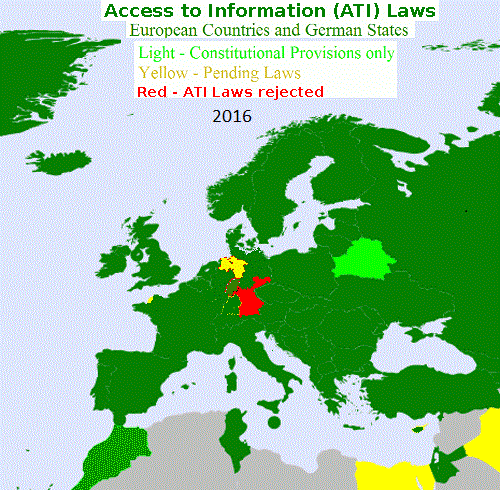Please do not hesitate to
mail
me if you have comments.
Walter Keim
Torshaugv. 2 C
N-7020 Trondheim, 18.4.2002 (Updated 18.6.02)
E-mail: walter.keim@gmail.com
To the
Human Rights Committee
c/o OHCHR-UNOG,
United Nations Office
8-14 avenue de la Paix
CH-1211 Geneva 10, Switzerland
Fax. No. (41-22) 917 9022
Violation of Article 19 paragraph 2 (Freedom of information) of the
ICCPR1
by Germany
This complaint is about the lack of freedom of
information (FOI, also called right to know or public access to
official documents or administrative transparency) in the Federal Republic of
Germany and 12 of its 16 Bundesländer. I am a German citizen.
I am referring to Article 19, paragraph 2 of the
International Covenant on Civil and Political Rights
(ICCPR)1
of 19. December 1966:
"Everyone shall have the right to freedom of expression; this right
shall include freedom to seek, receive and impart information and ideas of all
kinds, regardless of frontiers, either orally, in writing or in print, in the
form of art, or through any other media of his choice."
Germany signed and ratified this treaty (BGBl. 1973 II S. 1534).
The "freedom to seek" is discussed in successive recent annual reports to the UN Commission on Human
Rights. The
Special Rapporteur has stated clearly that the right to access information held
by public authorities is protected by Article 19 of the International Covenant
on Civil and Political Rights (ICCPR), as the following excerpt from his
report, in 1999 (UN Doc. E/CN.4/1999/64, para. 12)2, illustrates:
[T]he Special Rapporteur expresses again his view, and emphasizes, that
everyone has the right to seek, receive and impart information and that this
imposes a positive obligation on States to ensure access to information,
particularly with regard to information held by Government in all types of
storage and retrieval systems - including film, microfiche, electronic
capacities, video and photographs - subject only to such restrictions as
referred to in article 19, paragraph 3, of the International Covenant on Civil
and Political Rights.
The report of the UNHCR-Special
Rapporteur, Mr. Abid Hussain, "Promotion and protection of
the right to freedom of opinion and expression", (UN Doc. E/CN.4/1998/40)3
of 28. January 1998, especially Part
III. A. The right to seek and receive information, demands
FOI as a precondition of freedom of opinion. This is confirmed and strengthened
in (UN Doc. E/CN.4/2000/63)4
part 42. "B. Access to information": FOI "is one of the rights
upon which free and democratic societies depend". The Executive
summary of this report states:
The Special Rapporteur concludes the report with his recommendations. As the
right to freedom of opinion and expression is violated regularly in States with
widely different political and institutional frameworks, he urges Governments to
scrutinize their domestic legal systems to bring them in line with international
standards.
Article 19 - the International Centre
Against Censorship5 is often mentioned in this report.
The organization ARTICLE 195
gives a detailed
discussion on the subject in report "Freedom of Information as an Internationally Protected Human
Right"6.
Based on a survey on trends of freedom of information worldwide (ISBN
1 902598 44 X) the organization ARTICLE 195
concludes in part 1.67, that
this right is widely recognized as human right.
In Europe 4 countries are working with FOI pending bills, all the
other countries have FOI in the constitution and/or laws. If these 4 countries will approve FOI laws,
Germany which stopped its efforts, will be
the only country in Europe without Freedom of information.
 European countries both
inside the EU and outside have adopted freedom of information in constitutions
8 and laws
9.
Therefore freedom of information is widely implemented
10: http://wkeim.bplaced.net/foi-europe.gif
also in the EU
Commission 11, Council
12
and
Parliament 13 on
the basis of the EU
Charter of Fundamental Rights 14 (Art. 42).
European countries both
inside the EU and outside have adopted freedom of information in constitutions
8 and laws
9.
Therefore freedom of information is widely implemented
10: http://wkeim.bplaced.net/foi-europe.gif
also in the EU
Commission 11, Council
12
and
Parliament 13 on
the basis of the EU
Charter of Fundamental Rights 14 (Art. 42).
In environmental matters freedom of information is implemented according to a
EU directive (Council
Directive 90/313/EEC). This was adapted not 31. December 1992 but
nearly two years too late on 15. July 1994. German
bureaucracy tried to hinder Germans with help of high costs to use freedom of
information. The European commission won (Case
C-217/97) at the European High Court to achieve that Germans could benefit
from freedom of information in environmental subjects.
To me the need of freedom of
information became clear while writing petitions on
patients rights 15. Why is it so difficult
in Germany to get to know patients rights? Why is patient
participation Rec (00)5
16 only studied but not implemented? Why are the The 5th Conference of Health Ministers
on patients
rights of the Council of Europe
17 not translated to German? I
suggested to the German government
18 and the Council
of Europe 19 to start to translate Council
recommendations and publish them. Why is there no possibility to complain to independent bodies (before going to court) to support these
rights if they are not granted?
According to the World
Health Report 2000 20 Germany has the most expensive health system in the EU, but is on
rank
25 21
among industrial states looking at the quality of services.
Why did Germany not sign Convention on Human Rights and Biomedicine
22(Article
10: "Everyone is entitled to know any information
collected about his or her health")? The
Index Foundation writes: Patient
rights are a reflection of human rights.
23
 The German government has invited
citizens to discuss a proposal for a law on freedom of
information for Germany. I participated in this
discussion 24. However I was told that the process
of discussions between German ministers to bring this proposal to
parliament may not be finished during this parliamentary session 24. Therefore I
suggested to the parliament i a petition 21.12.01
25
to give this law anyway by own initiative. But the coalition parties failed: http://www.heise.de/newsticker/data/anw-04.06.02-004/.
The parliament of the Land
Baden-Württemberg has refused freedom of information as proposed in petition on freedom of
information of 20.12.01 26.
The German government has invited
citizens to discuss a proposal for a law on freedom of
information for Germany. I participated in this
discussion 24. However I was told that the process
of discussions between German ministers to bring this proposal to
parliament may not be finished during this parliamentary session 24. Therefore I
suggested to the parliament i a petition 21.12.01
25
to give this law anyway by own initiative. But the coalition parties failed: http://www.heise.de/newsticker/data/anw-04.06.02-004/.
The parliament of the Land
Baden-Württemberg has refused freedom of information as proposed in petition on freedom of
information of 20.12.01 26.
In the answer to a petition on patients rights of 25.10.2001
27 the parliament
did not comment on human rights violations.
The German constitution protects the right to freedom of expression and
information in article 5. Unfortunately the right to information is limited to
"open sources" ("allgemein zugänglichen Quellen"). Therefore
the Constitutional Court (Verfassungsgericht) refused to process a complaint: http://wkeim.bplaced.net/v-klage_en.htm. The
scientific work of Professor J. Wieland: "Freedom of information"
28
shows that the Germany law system is build on the principle of "dominance
of official secrecy (Amtsgeheimnis, which) has
its roots in absolutism and bureaucracy. Absolutism accepts the governor as a
father-figure in the role of a guardian".
The
highest Court in Rheinland-Pfalz LG
Mainz (1 QS 25/98) 29
stated that the court can not give access to documents (as human rights
would demand), because it is the parliament, which would have to give this
right. This case is about access to documents of an accused, but shows that
human rights need support.
It seems that courts ask for laws, while German parliaments up to now do not
even comment on the question of violation of the human right of freedom of
information.
I have done un investigation who is responsible for the lack of freedom of information in Germany:
http://wkeim.bplaced.net/I_accuse.htm.
 The European Commission wrote to me http://wkeim.bplaced.net/330166.htm
not to be
responsible for freedom of information for member states and points to the Recommendation
Rec(2002)2 30 of the Committee of Ministers to member states on access to
official documents.
Unfortunately this is just a recommendation. Article 10 of the
European Convention on Human Rights 31 does not include FOI. Germany has ignored "Recommendation
No. R (81) 19" 32 on the access to information held by public authorities
from 1981 and did not even translate it to German
19.
The European Commission wrote to me http://wkeim.bplaced.net/330166.htm
not to be
responsible for freedom of information for member states and points to the Recommendation
Rec(2002)2 30 of the Committee of Ministers to member states on access to
official documents.
Unfortunately this is just a recommendation. Article 10 of the
European Convention on Human Rights 31 does not include FOI. Germany has ignored "Recommendation
No. R (81) 19" 32 on the access to information held by public authorities
from 1981 and did not even translate it to German
19.
The "European
Parliament resolution on the situation as regards fundamental rights in the
European Union (2000) (2000/2231(INI))" 33
document A5-0223/2001
"notes ... that both the EU institutions and the Member States (should) uphold the
rights set out in the various Chapters of the EU Charter". I have written a
petition to the European Parliament: http://wkeim.bplaced.net/petition_eu.htm,
which will be processed. Unfortunately
the European Parliament can not give laws alone, but is dependent on the Council
of the EU to give laws.
Since the European Council only gives recommendations, the EU Commission and
EU Council do not support freedom of information in member states, I ask the
Centre for Human Rights of the United Nations to process this individual complaint
according to the Optional
Protocol to the International Covenant on Civil and Political Rights of the ICCPR
1.
This complaint is published on the Internet: http://wkeim.bplaced.net/petition_un.htm.
Sincerely,
Walter Keim
E-mail: walter.keim@gmail.com
Support Freedom of Information: http://wkeim.bplaced.net/foil.htm#e-mail
Support Patients' Rights: http://wkeim.bplaced.net/patients.htm#e-mail
Copy: UNHCR-Special
Rapporteur, EU Convention, President
of the EU Commission, EU Council
Appendix:
- International Covenant on Civil and Political Rights
(ICCPR): http://www1.umn.edu/humanrts/instree/b3ccpr.htm
or https://en.wikipedia.org/wiki/ICCPR
- (UN Doc.
E/CN.4/1999/64): http://www.hri.ca/fortherecord1999/documentation/commission/e-cn4-1999-64.htm
- UN Doc. E/CN.4/1998/40
of 28. January 1998: http://www.unhchr.ch/Huridocda/Huridoca.nsf/TestFrame/7599319f02ece82dc12566080045b296?Opendocument
- UN Doc. E/CN.4/2000/63:
http://www.hri.ca/fortherecord2000/documentation/commission/e-cn4-2000-63.htm
- Article 19 - the International Centre
Against Censorship: http://www.article19.org/
- Freedom of Information as an Internationally Protected Human
Right: http://wkeim.bplaced.net/files/Mendel-627.htm
- GLOBAL TRENDS ON THE RIGHT TO INFORMATION: A SURVEY OF SOUTH ASIA
ISBN
1 902598 44 X: http://www.juridicas.unam.mx/publica/rev/comlawj/cont/1/cts/cts3.htm
- Freedom
of information in Constitutions: http://wkeim.bplaced.net/foil.htm#constitutions
- Freedom
of information in laws: http://wkeim.bplaced.net/foil.htm#eu
- Freedom of
information: http://wkeim.bplaced.net/foil.htm
- Access to EU Commission documents: http://europa.eu.int/comm/secretariat_general/sgc/acc_doc/index_en.htm
- Council of the EU: ACCESS TO DOCUMENTS: PUBLIC REGISTER:
http://register.consilium.eu.int/utfregister/frames/introfsEN.htm
- Public register of European Parliament documents:
http://www.europarl.eu.int/register/default_en.htm
- The Charter of Fundamental Rights of the European Union: http://www.europarl.eu.int/charter/default_en.htm
- Petitions by Walter Keim: http://wkeim.bplaced.net/petitionen.htm
- Recommendation Rec (2000) 5 on the development of structures for citizen and patient participation in the decision-making process affecting health care:
http://www.social.coe.int/en/qoflife/recomm/R(00)5.htm
- The 5th Conference of Health Ministers: http://www.social.coe.int/en/qoflife/patients.htm
- Letter to German Foreign minister Fischer: http://wkeim.bplaced.net/011223fischer.txt
(no answer)
- Letter to Council of Europe: http://wkeim.bplaced.net/020106coe.htm
- World
Health Report 2000: http://www.who.int/whr/2001/archives/2000/en/index.htm
- http://www.photius.com/rankings/healthranks.html
- Convention on Human Rights and Biomedicine:
http://conventions.coe.int/Treaty/en/Treaties/Html/164.htm
- Index Foundation: http://www.index-bg.org/Frame/rights/Frame_all.htm
- Informationsfreiheit: http://wkeim.bplaced.net/IFG.htm
- Petition 21.12.2001: http://wkeim.bplaced.net/petition_ifg.htm
- Petition 21.12.01 on freedom
of information: http://wkeim.bplaced.net/petition_bw.htm
- Petition on patients rights of 25.10.2001:
http://wkeim.bplaced.net/petition3.htm
- Professor J. Wieland: "Freedom of information":
http://www.mpp-rdg.mpg.de/pdf_dat/wieland.pdf
- Highest Court in Rheinland-Pfalz LG
Mainz (1 QS 25/98): http://www.wdr.de/tv/recht/urteile/leitsatz/rl01184.html
- Recommendation
Rec(2002)2: http://cm.coe.int/stat/E/Public/2002/adopted_texts/recommendations/2002r2.htm
- European Convention on Human Rights:
http://www.pfc.org.uk/legal/echrtext.htm#article10
- RECOMMENDATION No. R (81) 19 ON THE ACCESS TO INFORMATION HELD BY PUBLIC AUTHORITIES
Recommendation
No. R (81) 19
- "European
Parliament resolution on the situation as regards fundamental rights in the
European Union (2000) (2000/2231(INI))" document A5-0223/2001:
http://www2.europarl.eu.int/omk/OM-Europarl?PROG=REPORT&L=EN&PUBREF=-//EP//TEXT+REPORT+A5-2001-0223+0+NOT+SGML+V0//EN
This complaint will gain from comments and contributions to improve it. Please do not hesitate to
mail
me if you have comments.
Warning: I do not accept any liability
that the information on these pages is correct, accurate or up to date!
Please feel free to link this site!
Visitor No.  since 13.3.2002
since 13.3.2002
[Zurück
zu allen Petitionen] [Back to page on FOI] [Back to Homepage]
 European countries both
inside the EU and outside have adopted freedom of information in constitutions
8 and laws
9.
Therefore freedom of information is widely implemented
10: http://wkeim.bplaced.net/foi-europe.gif
also in the EU
Commission 11, Council
12
and
Parliament 13 on
the basis of the EU
Charter of Fundamental Rights 14 (Art. 42).
European countries both
inside the EU and outside have adopted freedom of information in constitutions
8 and laws
9.
Therefore freedom of information is widely implemented
10: http://wkeim.bplaced.net/foi-europe.gif
also in the EU
Commission 11, Council
12
and
Parliament 13 on
the basis of the EU
Charter of Fundamental Rights 14 (Art. 42).


